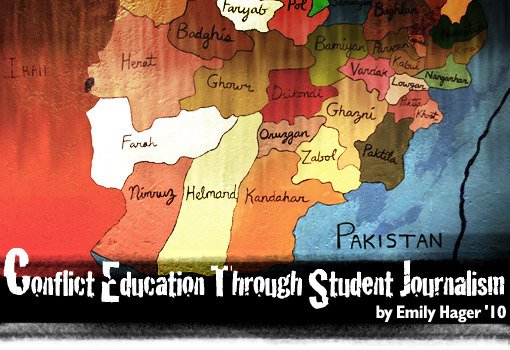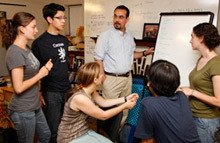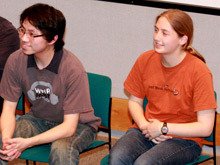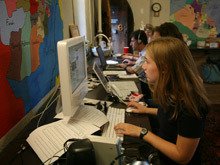Conflict Education Through Student Journalism


Emily Hager '10 is a physics major with a minor in biology from Concord, Mass. She has been a reporter with War News Radio since her first year on campus and has covered stories ranging from music and poppy replacement strategies in Afghanistan to health care and refugee issues in Iraq. She also helps produce the show each week and writes the weekly newscast. Write to her at ehager1@swarthmore.edu.
The following is adapted from an essay that appears in the Spring 2009 issue of the Harvard Educational Review. The complete text is available here.
 t is one o'clock in the morning, and all I want to do is go to bed. I've been at War News Radio since 11:30 p.m., trying to get through to Afghanistan to do an interview with Shukria Barakzai, one of the first female Afghan politicians. But it's Eid al-Fitr, a holiday, and all the working phone lines in Afghanistan are tied up with people calling their family and friends to celebrate. I dial the number on the phone card, wait, and dial the number I have for Ms. Barakzai.
t is one o'clock in the morning, and all I want to do is go to bed. I've been at War News Radio since 11:30 p.m., trying to get through to Afghanistan to do an interview with Shukria Barakzai, one of the first female Afghan politicians. But it's Eid al-Fitr, a holiday, and all the working phone lines in Afghanistan are tied up with people calling their family and friends to celebrate. I dial the number on the phone card, wait, and dial the number I have for Ms. Barakzai.
Finally, the phone rings and she picks up. "Is this still an alright time for you to do the interview?" I ask. And from the other side of the world, she says yes. For her, it's 10:30 a.m., a normal hour to work. As we talk, she tells me about her experiences as a politician and as a woman, her concerns about Afghanistan's elections next year, her frustration with the corruption she sees in the Afghan government, and her hopes for the future of her country. In listening to her stories, all of my own frustrations-with the late hour, with the nonfunctional phone lines, with the recording equipment-melt away, and I remember why I am still here in the recording booth at War News Radio, even at one o'clock in the morning.

Journalist-in-residence Abdullah Mizead joined War News Radio this fall after working at NPR as a producer and translator alongside NPR Director of Operations Charlie Mayer '98.
I first walked through the door of the War News Radio studio at Swarthmore College in September 2006. I hovered in the back of the meeting, looking over the maps of Iraq and Afghanistan handpainted on the walls and watching and listening as ideas for radio pieces took shape on the whiteboard at the front of the room. Just back from their summer break, the other students had jumped right into a discussion on the war in Iraq. With the guidance of the "journalist in residence" — the professional journalist who advises the program — they were tossing around story ideas for the half-hour radio show they would produce that week. The ideas were interesting, but the thing that caught my attention most was the level of the discussion in the room. All of the students were extremely well-informed about what was going on in Iraq, throwing around the names of Iraqi politicians and American military acronyms as if they had been following these issues all their lives. They had insightful questions and opinions on the war, and, unlike anyone else I knew, they were determined to get their questions answered-all from the confines of a small liberal arts college in Pennsylvania.
By the end of the meeting, I wanted to be one of those students. I wanted to know about issues that were this important, this contemporary, and this relevant. I wanted to be able to hold my head up in a discussion with experts on the wars and, more importantly, with the people who were being most affected by the violence. I wanted to know what the war was like-to go beyond the cold statistics and find the human stories. Now, two and a half years later, I am a junior at Swarthmore College, I still work at War News Radio, and I learn something new-about the wars but also about responsibility, complexity, leadership, and morality-with every new broadcast.

Longtime War News Radio staffers such as Emily and Hansi Lo Wang '09 often discuss their work to groups on campus, such as at this event during a recent Family Weekend.
Putting together a radio show is like no assignment I have ever had in an academic class. The essential task is the same: to find, understand, and communicate information. But the process and the learning environment at War News Radio are very different from what takes place in a typical classroom. Reporting for War News Radio teaches us not only the essential facts of the wars but also the human experiences behind those facts. It is an approach that humanizes, rather than objectifies, participants from all sides of the conflict. Working at War News Radio has encouraged me and my fellow reporters to develop a sense of personal responsibility about violent political conflict, and to take initiative in our own education. As reporters at War News Radio, we are not just staring down from the ivory tower. We learn to consider the immense complexity of a contemporary war, and we learn to communicate what we know about these conflicts to a broad audience in a meaningful way. Most importantly, we learn that it is possible for us to go out and find answers to our most pressing questions about the world around us.
The most important things I have learned through my work with War News Radio are not pieces of information but skills and attitudes that have changed the way I interact with the world around me. I came to Swarthmore intimidated by the sheer magnitude of the problems I saw in the world. I was not an outgoing person, and my first interview for a War News Radio piece was terrifying. Now, two years later, I want to get my questions about the issues I care about answered directly by the people who know these answers, and I have learned to get over being afraid to ask. Students at War News Radio move beyond being passive consumers of knowledge created by others and toward being lifelong learners, producers of knowledge, and active citizens. We have learned how to write effectively and how to cope with our own group tensions. Graduates of the program take what they learn about journalism, the power of asking questions, and the effects of the wars with them when they leave Swarthmore. Some War News Radio graduates have become radio and television reporters, even though they had never intended to go into journalism at all. Other War News Radio alumni have gone on to become experts in Iraqi refugee issues or to travel the Middle East and the world with recorders in hand.

"We grow intellectually through our work with War News Radio as we gain a deeper understanding of the complexities of the war," Emily says, "and we engage with the conflict in a personal and moral sense by taking responsibility for our reporting."
War News Radio reporters develop more than just skills and a liking for journalism. Some War News Radio reporters have founded similar programs in efforts to extend what they see as a key experience-student journalism-to spotlight other issues and give access to other students. These projects include the Darfur Radio Project, a student-run radio show on the conflict in Darfur; Chinatown Youth Radio Philadelphia, for high school students in Philadelphia's Chinatown; and the Swarthmore Migration Project, a blog that focuses on the experiences of migrants around the world. We all hope for a day when there is no need for radio programming about war news. But as an example of education that motivates learning and enhances its quality via real engagement with the world, we hope that War News Radio is only a beginning.
Marjorie Murphy, a Swarthmore professor who has been with War News Radio since its inception, described the ideal: "This is exactly what you need in a liberal arts school: something that empowers students, and empowers them to empower others." For me, working with War News Radio has been the most formative experience of my time at Swarthmore. It has given me the confidence and experience to take on a leadership role in a project that has pushed the limits of what I believed was possible. It has expanded my understanding of the practical, ethical, and personal issues involved in a conflict that is all too real, and it has led me to think critically about myself and my own role as a citizen of a complex, challenging, and sometimes violent world.


